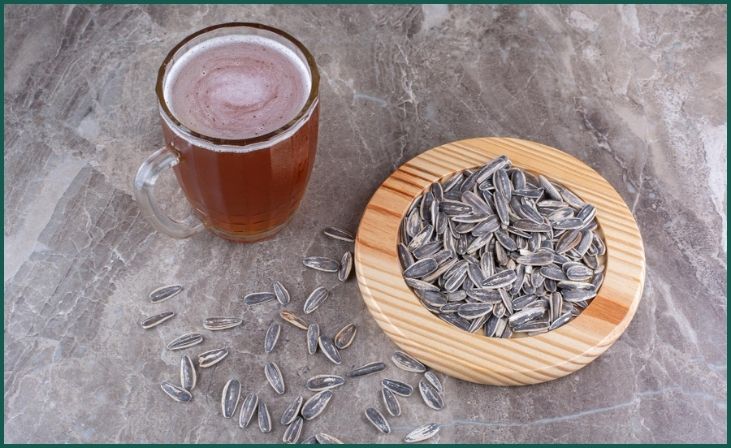Sunflower seeds aren’t just a delicious treat; they’re a nutritional powerhouse, brimming with essential nutrients that can significantly benefit your health. Beyond their delightful taste, these tiny seeds boast an impressive array of advantages. They’re known to promote heart health by reducing cholesterol levels and supporting overall cardiovascular function. Additionally, their rich vitamin E content bolsters immunity, helping your body fend off illnesses and infections.
With their abundance of nutrients, including magnesium, selenium, and healthy fats, sunflower seeds also contribute to maintaining healthy skin, supporting bone health, and regulating blood sugar levels. Incorporating sunflower seeds into your diet can be a simple yet effective way to enhance your overall well-being and enjoy a multitude of health benefits.
Table of Contents
ToggleBenefits of Sunflower Seeds
Rich in Nutrients
Sunflower seeds stand as a testament to nutritional excellence, offering a diverse array of essential nutrients essential for optimal health. Bursting with protein, fiber, and beneficial fats, they serve as a nourishing snack or addition to meals. Within just a handful, you’ll find a substantial portion of your daily nutrient needs, particularly for vital elements like vitamin E, magnesium, selenium, and zinc.
This compact yet potent package not only satisfies hunger but also fuels your body with the building blocks it needs for sustained energy, strong immunity, and overall well-being. Whether sprinkled atop salads, blended into smoothies, or enjoyed straight from the bag, sunflower seeds make a delightful and nutritious addition to any diet.
Read Also: 8 Best Hair Growth Vitamins For Longer & Stronger Hair
Supports Heart Health
Integrating sunflower seeds into your diet can be a proactive step toward fostering heart health. Abundant in heart-friendly fats, specifically monounsaturated and polyunsaturated fats, these seeds play a pivotal role in lowering cholesterol levels, thereby mitigating the risk of heart disease. Moreover, the inclusion of vitamin E, a potent antioxidant found in sunflower seeds, further contributes to cardiovascular well-being.
Vitamin E acts as a protective shield for the heart, combatting damage caused by free radicals. By incorporating these nutrient-rich seeds into your daily meals or snacks, you not only enhance the overall nutritional profile of your diet but also support your heart’s resilience and contribute to a proactive approach to cardiovascular health.
Boosts Immunity

Sunflower seeds emerge as a potent ally in fortifying the body’s immune system, boasting a treasure trove of nutrients crucial for optimal immune function. Among these, vitamin E stands out, assuming a pivotal role in bolstering immunity. This vital nutrient not only acts as a shield against free radicals but also empowers the body to mount a robust defense against infections and diseases.
Furthermore, sunflower seeds offer a generous supply of zinc, a mineral indispensable for the proper functioning of immune cells and the body’s ability to combat infections. By incorporating these nutrient-dense seeds into your diet, you not only provide your body with essential building blocks for a resilient immune system but also fortify your defenses against illnesses, fostering overall health and well-being.
Don't just scroll, subscribe!
BuzzTrail's unique web-stories are the cure for boredom you've been waiting for.
Supports Bone Health
Sunflower seeds emerge as a valuable resource for nurturing robust bone health, thanks to their rich mineral content, encompassing essential elements like magnesium, phosphorus, and copper. These minerals collectively contribute to the maintenance of sturdy and resilient bones. Magnesium assumes a pivotal role in regulating calcium levels within the body, a vital component for bone strength and density. Phosphorus, on the other hand, plays a crucial role in the formation and structural integrity of bones, ensuring they remain sturdy and resilient.
Additionally, the presence of copper in sunflower seeds supports collagen production, a key factor in maintaining bone health and strength. By incorporating sunflower seeds into your diet, you provide your body with the necessary minerals to uphold bone integrity, fostering long-term skeletal health and vitality.
Promotes Skin Health
Sunflower seeds emerge as a natural ally in the pursuit of radiant skin, owing to their abundant vitamin E content. This potent antioxidant serves as a formidable shield against skin damage inflicted by free radicals and harmful UV radiation. Moreover, vitamin E plays a pivotal role in facilitating skin repair and regeneration, fostering a smooth and youthful complexion.
By incorporating sunflower seeds into your diet, you embark on a journey towards skin rejuvenation and vitality, potentially diminishing the visible signs of aging and enhancing your skin’s natural luminosity. With each bite of these nutrient-rich seeds, you nourish your skin from within, contributing to a radiant and healthy appearance that emanates from the inside out.
Supports Weight Management
Despite their diminutive stature, sunflower seeds wield significant potential in aiding weight management efforts. Packed with a trifecta of satiating nutrients—fiber, protein, and healthy fats—they excel in promoting feelings of fullness and satisfaction. Incorporating sunflower seeds into your meals or snacks can effectively curb cravings and prevent overindulgence, thereby facilitating the maintenance of a healthy weight.
Furthermore, the protein and fiber found in these seeds play a crucial role in regulating blood sugar levels and mitigating the risk of insulin resistance, contributing to overall metabolic health. By harnessing the nutritional prowess of sunflower seeds, you can empower your weight management endeavors and foster a balanced approach to nourishment and well-being.
May Reduce Inflammation

Chronic inflammation poses a significant risk factor for a myriad of health issues, ranging from heart disease to cancer. Sunflower seeds emerge as a potent ally in combatting inflammation, thanks to their rich array of anti-inflammatory compounds. Vitamin E, selenium, and phytochemicals such as flavonoids and phenolic acids found in sunflower seeds collectively work to quell inflammation within the body.
By incorporating these seeds into your diet as part of a well-rounded eating plan, you may effectively mitigate inflammation and lower the risk of chronic diseases associated with prolonged inflammation. Harnessing the anti-inflammatory prowess of sunflower seeds offers a proactive approach to safeguarding overall health and promoting longevity, ensuring that you thrive with vitality and well-being.
Conclusion
Sunflower seeds are not just a tasty snack; they are a nutritional powerhouse with numerous health benefits. Rich in heart-healthy fats, vitamins, and minerals, these tiny seeds support various aspects of health. Their abundance of vitamin E and zinc boosts immunity, while magnesium and phosphorus contribute to bone health. Moreover, their antioxidant properties promote skin health and protect against aging. Whether enjoyed as a snack, sprinkled on salads, or baked into goods, sunflower seeds offer versatility and flavor. By incorporating them into your diet regularly, you can enhance your overall well-being and nourish your body with essential nutrients.
FAQs
Are sunflower seeds good for heart health?
Are sunflower seeds good for heart health?
Yes, sunflower seeds are good for heart health. They are rich in heart-healthy fats, such as monounsaturated and polyunsaturated fats, which can help lower cholesterol levels and reduce the risk of heart disease.
Can sunflower seeds boost immunity?
Can sunflower seeds boost immunity?
Yes, sunflower seeds can boost immunity. They are packed with nutrients, including vitamin E and zinc, which play essential roles in supporting a healthy immune system.
Do sunflower seeds support bone health?
Do sunflower seeds support bone health?
Yes, sunflower seeds support bone health. They are a good source of magnesium, phosphorus, and copper, which are important minerals for maintaining strong and healthy bones.

